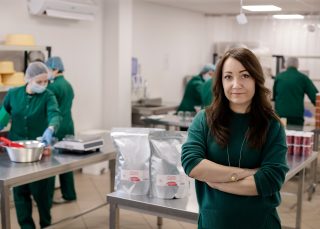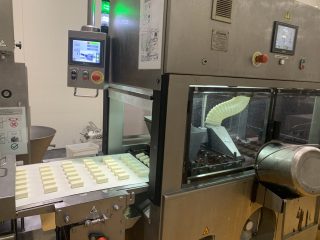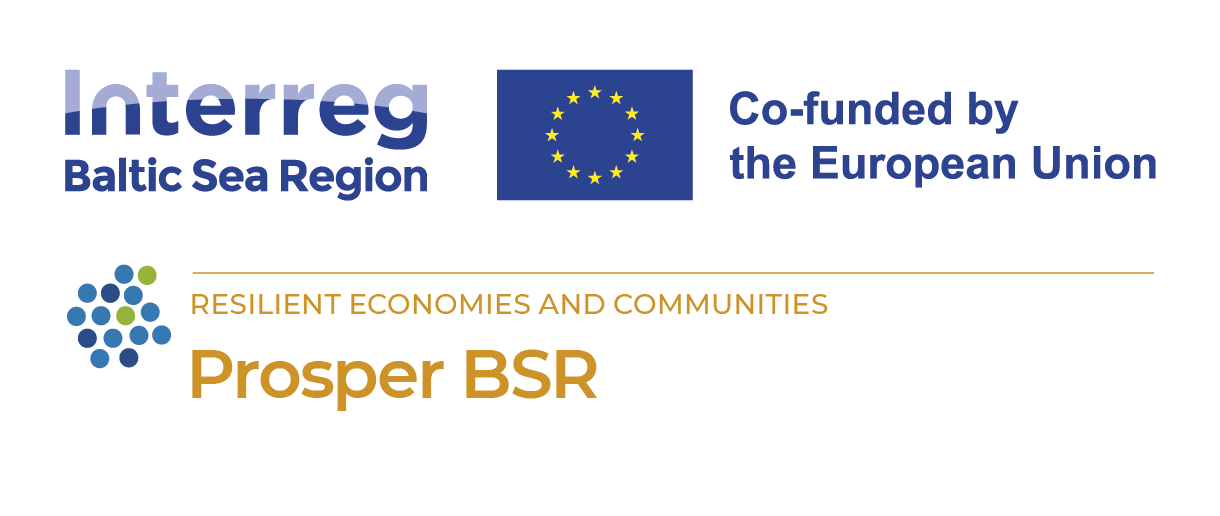Social Responsibility as Part of Reciprocal Trade-Off
Ukrainians are Motivated Workers says Lithuanian employer Varėnos pienelis
Success story: Social Responsibility as Part of Reciprocal Trade-Off
According to Lithuanian Statistics, over 75,000 Ukrainians have arrived in Lithuania since the beginning of the war in Ukraine. After receiving temporary shelter, the main issue for the Ukrainians has been how to make a living. Responsible businesses in Lithuania have stepped up to help the refugees, including Supergarden, a producer of freeze-dried berries, spices and vegetables.

Laura Kaziukonienė, the founder and CEO of the company, says that the decision to help the Ukrainians was a natural one. The company had a branch in Ukraine, so when the war broke out, she invited people who worked in Ukraine to Lithuania. However, only one manager and her daughter came. At the beginning of December last year, they went back to Ukraine to join with their husband and father.
Afterwards, Supergarden employed a few more Ukrainians in the factory, with whom it had no previous working or personal relationship. They settled in Panevėžys and began to look for work. “Although their specialty was not in packaging, we took the time to train them,” Kaziukonienė says. “Some of them took temporary jobs, and one woman plans to put down her roots in Lithuania and continue working for Supergarden. Her child attends a school in Panevėžys, and she supports her family.” As for foreigners, a student from Greece has been currently doing an internship at the company, having come through the Erasmus international student exchange program.
Overcoming the Language Barrier
Most Ukrainians who come to Lithuania can only communicate in their mother tongue or Russian. According to the Lithuanian Statistics Department, more than 90% of Lithuanians speak at least one foreign language; however, not all of them speak the same language. Only the older generation can communicate in Russian without problems, while those born after 1986 have a good command of English, French, German and other languages. Supergarden’s CEO notes that even then, it is possible to communicate.
For example, a manager, who came from Ukraine, worked at the company as an export manager for Russian-speaking markets. Supergarden’s sales department consists of younger people, the majority of whom do not speak Russian. Nevertheless, one Ukrainian woman had already learnt a number of Lithuanian words over the course of a year, the words directly related to her job, product names, etc. Kaziukonienė observes that those who do not know Russian communicate with the help of the google translate, while the sales manager, who has not yet mastered Russian, has been improving his skills, as the Ukrainian employee does not speak English at all.
The situation is less complicated in Supergarden’s manufacturing sector, where older staff members speak Russian.
Adaptability Is Critical

Supergarden specializes in freeze-dried berries, spices and vegetables. Freeze-drying is by far the most efficient food preservation technology. This process preserves up to 98% of the nutrients, vitamins and minerals in vegetables, berries, fruit and other foods. The company’s CEO points out that broad horizons and adaptability are critical for their innovative business.
This is especially true in recent times, when everything has been constantly changing, i.e. pandemics and war. Kaziukonienė thinks that employing foreigners in this current geopolitical situation is very useful because it broadens one’s thinking. “For one, it teaches you that Russian can be seen not as an aggressor but as another foreign language that you don’t carry around on your shoulders,” the CEO notes. “Also, working with Ukrainians nurtures one’s empathy. It is one thing to see war refugees on the TV and quite another to see that refugee in person every day, to see how they cry when they receive messages from their relatives who have remained in Ukraine.” Kaziukonienė is convinced that such situations teach us to be more sensitive to surroundings and at the same time to realize how important it is to adapt quickly to new circumstances.
Not Just Charity
Supergarden fosters a long-standing friendship with the Panevėžys Day Care Centre Šviesa, where children and young people with Down syndrome and other intellectual disabilities receive assistance. They help company by folding small paper packages. It is a very demanding activity that develops fine motor skills. Together with the Aurika printing company, Supergarden organized a competition across Lithuania where children drew packaging for the company’s products. All proceeds from the sale of products with these labels will go to Šviesa. “Of course, just like every year at Christmas, we will also give gifts to the Center’s patrons,” the CEO says.

Supergarden’s CEO points out that social responsibility is not a charity given occasionally and driven by the desire to appear good. From Kaziukonienė’s point of view, social responsibility is a reciprocal trade-off. “We help the children by providing them with the activities and by giving financial support, and the children help us by doing the packaging. It is the same with the Ukrainians: We have given them all the moral and material support we can and they repay us with sincere and quality work,” the CEO says. The company is not just giving but also getting back. In this way, social responsibility becomes a very well-oiled mechanism that builds long-term relationships.
Success story: Ukrainians are Motivated Workers says Lithuanian employer Varėnos pienelis
Currently, there are 74,6 thousand Ukrainian refugees in Lithuania, according to Lithuanian statistics: War refugees from Ukraine. Based on data from Lithuanian Employment Service, since the beginning of the war in Ukraine, more than 21 thousand Ukrainians have been employed in all municipalities of Lithuania, and almost every third in Vilnius.
The Ukrainians who have taken up jobs at Varėnos pienelis in Alytus county, have helped to solve the shortage of workers at this small dairy company. Jolanta Kuzminienė, the director of the company, says that the Ukrainian workers are responsible and very motivated.

The first Ukrainians started working at Varėnos pienelis about four years ago. At that time, the workforce was tight, and the company’s manager tried to attract workers from other towns, but without success. “There was a shortage of male workers (women cannot work in some positions due to the greater need for physical strength) but could not find them in the surrounding areas. When we found out that there was an opportunity to employ foreigners, we decided to give it a try,” Kuzminienė says.
Sixteen Ukrainians are currently working in the company in Varėna. They came in three waves. The first wave was made up of men who arrived to Lithuania a few years ago. They left their families back home and came here to earn money. The second wave was arranged: in cooperation with a company in Ukraine, the necessary skilled workers were selected. The third wave Varėnos pienelis labor shortage, which the company has been experiencing every year for the last ten years. “This spring, we were short of as many as twenty workers,” the director of the company says. “The Ukrainians made up for this shortage.”
Cooperation
Kuzminienė says that the Ukrainians not only helped to reduce the shortage of workers, but also to increase production volume. The company could take on even more workers, because it wants to function at even higher capacity. “Our company regularly faces labor shortages because the Lithuanian labor market has a big obstacle—the benefit system. Some people have perfected such a living that they are not motivated by salaries, at least in our country,” the director regrets.

According to her, Ukrainians are a different matter. They are motivated to work and earn. “For us, this has multiple benefits. First, we fill empty jobs and can produce more. Secondly, it is good to help people. Our company has always been committed to charity and social aid, so it was never a question of helping refugees. We gave them shelter and offered them jobs so that they could earn and feel dignified,” Kuzminienė notes. She adds that all Ukrainians working in the company have a healthy attitude towards work. For them, work at the company is a source of livelihood, a way to save up and start a better life, to rebuild their homes when they return to Ukraine. Varėnos pienelis director regrets that young Lithuanians often see work as an obligation or a misery.
Adjusting the Working Environment
In Varėnos pienelis, the Ukrainians work in skilled jobs: men as line operators and women produce dairy products on the conveyor belt. The workers receive special training and instruction, as each workplace has its own specific requirements. “When the Ukrainians arrived, there was a language barrier. We had to make changes so that there was at least one Russian speaker on each floor to help us communicate,” Kuzminienė explains about the changes the company had to make. The company also translated all the necessary documents, instructions, etc. into Russian.
Accommodation of newcomers was a bit more of a challenge. There were no new constructions in Varėna, so it was almost impossible to find apartments for Ukrainians. The company was lucky enough to buy a four-room apartment. It arranged with another company to rent out the space, which Varėnos pienelis adapted and furnished. “Luckily, Ukrainians are not very different from us, Lithuanians, culturally,” Kuzminienė says. “We have had bitter experience with newcomers from Islamic countries. Because of their religious beliefs, they did not listen to women in higher positions. As southerners, they are used to move less and work less. They are also used to a collective way of life: If there are three of them, one of them will be the leader and two subordinates. This means that one of the three will not work.” The director of Varėnos pienelis notes that cultural differences are very important to keep in mind. She advises other companies to take them into account when thinking about hiring workers from abroad.
Work Helps Integration
Kuzminienė is pleased that Ukrainians have no problems with work. They are motivated and responsible, determined to earn a wage and not just to get one. “People have worked in their own country and lived with dignity, imagine how hard it is to ask for help when you flee to a foreign country. By giving people the opportunity to earn a living, we take a heavy burden off their shoulders,” the director says.
The various forms of support and child money do not arrive as quickly as people would like in Lithuania. Some women came from Ukraine as they are—without even the necessities. Thus, the company Varėnos pienelis divided up among the staff who would help which woman. In the beginning, before the children were enrolled in kindergartens and schools, the company arranged for some women to work and others to look after the children—like a family. “In fact,” Kuzminienė says, “our company is like a big family. We also pay a lot of attention to the psychological well-being of Ukrainians. If a woman does not hear from her husband or other relatives on the front lines for a long time, we try to support and encourage her.”
Work also distracts from negative thoughts. It also helps the Ukrainians to integrate into society, learn a language, earn money and get health insurance. It is a significant step towards building a better life or starting afresh.
